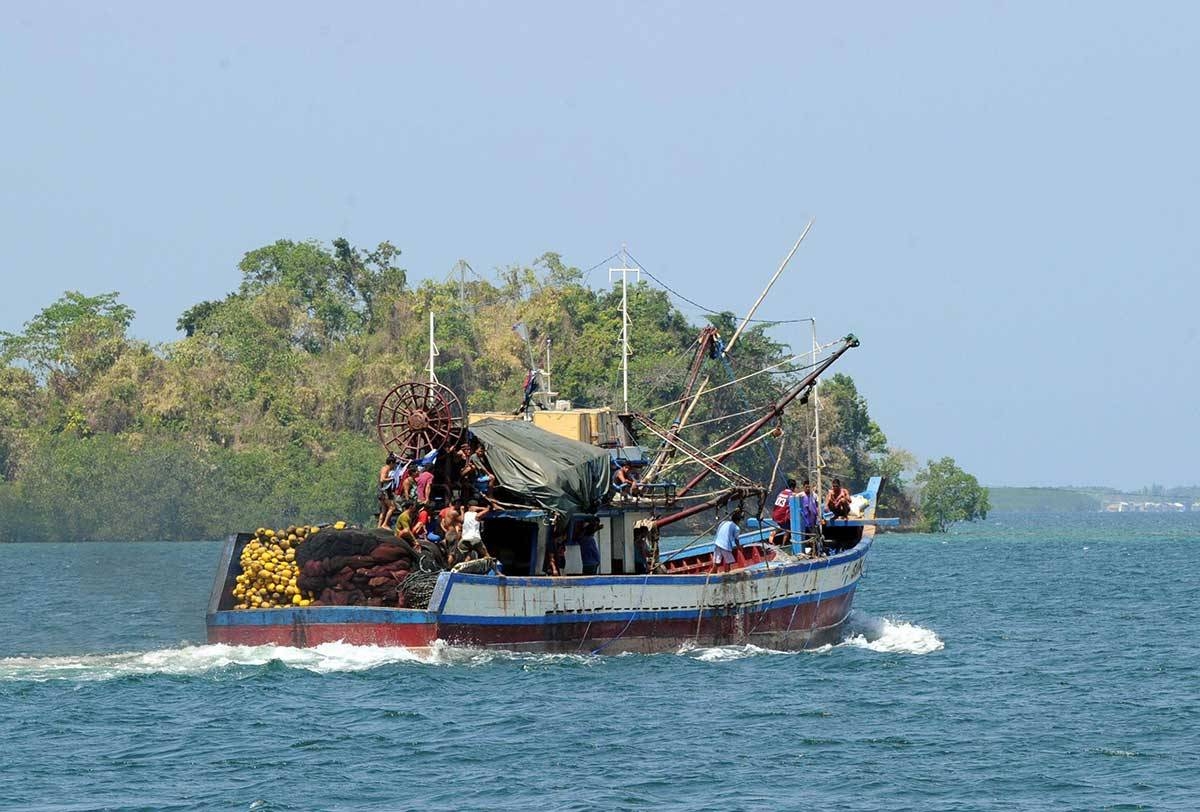
MASINLOC, Zambales – Filipino fishermen on Friday made an impassioned plea to lawmakers to help them return to their traditional fishing grounds in Bajo de Masinloc.
"Dinadaan ko na lang po sa luha, ramdam n'yo naman po siguro ang kahirapan namin.... Ipinanganak po kaming mahirap, sana kahit konting ginhawa lang po, [gusto po naming] maranasan kahit konting ginhawa lang po. Sana po ang hiling naming mga mangingisda, tulungan n'yo po kami (We just cry about it, and you should know what we are experiencing. We were born poor, and we hope to get some relief. We just want you to help us fisherfolk)," Nolly de los Santos, a fisherman from Sta. Cruz, Zambales, told members of the joint committees of National Defense and Security and Special Committee on the West Philippine Sea.
The two panels went to Masinloc town for a public consultation with the fisherfolk and local officials as part of their investigation into the "gentleman's agreement" said to have been reached by the Duterte administration and the Chinese government to defuse tensions in the West Philippine Sea.
Masinloc fisherfolk complain that fishing in Bajo de Masinloc has become more difficult because their movements are restricted by the China Coast Guard and the Chinese maritime militia.
The Chinese coast guard has even been directed to detain "trespassers" who venture into Bajo de Masinloc beginning next month.
China has taken control of the shoal, claiming it is part of its territory, despite being well within the Philippines' exclusive economic zone.
In his remarks read by Senior Deputy Speaker Aurelio Gonzales Jr., Speaker Martin Romualdez assured the fishermen that they are not alone in their fight for their rights in the West Philippine Sea, and that they are backed by President Ferdinand Marcos Jr., other government agencies, and even the international community.
Gonzales said that the fisherfolk's grievances will be relayed to the President and Romualdez.
Zambales 1st District Rep. Jefferson Khonghun suggested that the assistance that was given to the Bureau of Fisheries and Aquatic Resources (BFAR) be "tailor made" to the needs of fisherfolk. The bureau had provided the fishermen with small fiberglass boats instead of big fishing vessels.
"We will make sure in the next budget hearing that BFAR will extend the kind of assistance fisherfolk need. They have the funds for it," Khonghun said,
Sta. Rosa City Rep. Danilo Ramon Fernandez suggested an assistance program that is similar to the public utility vehicle modernization scheme.
"You have to consolidate and form cooperatives to obtain low-interest loans from the LandBank and even subsidies from the national government, like jeepney drivers, so you can have modern fishing boats," Fernandez said.
Zambales Gov. Hermogenes Ebdane Jr. said the provincial government is making P5 million available to every group of affected fishermen so they could acquire a bigger boat.
Surigao del Norte Rep. Robert Ace Barbers assured the 500 fishermen who attended the public hearing that they will study the policy that they will propose to Congress.
"Ayaw natin ng gulo, ayaw natin na naguumpisa ng gulo, pero alam niyo po ang Pilipino, 'wag nyong kalabitin. Tayo po ay magkaisa, manalangin tayo, dahil itong problema na ito ay hindi lang problema sa kasalukuyan (Filipinos are a peaceful people, but don't provoke them. Let us unite and pray together because this is not a short-term problem we are facing)," Barbers said.
Defense Secretary Gilberto Teodoro Jr. on Friday branded China's threat to detain Filipino fishermen venturing in Bajo de Masinloc as "a provocation."
Speaking during the 126th anniversary celebration of the Philippine Navy, Teodoro said China's "is a provocation and a violation to me of the United Nations Charter."
China issued the directive after a fleet of civilian boats eluded a Chinese blockade at Bajo de Masinloc to deliver food and fuel to Filipino fishermen there.
"Is this a provocation? No, I believe what a provocation is in the rubbish and irresponsible threat by a country to detain 'trespassers' in what is claimed as international waters but is actually part of the West Philippine Sea," Teodoro said.
China's "behavior is not only a violation of the United Nations Convention on the Law of the Sea but also a violation of the precepts of the United Nations Charter, which lays upon each responsible member state the duty to refrain from the threat or the use of force or aggression to enforce, particularly in this case, illegal territorial claims in the maritime domain," he said.
Teodoro said the mission of the Armed Forces of the Philippines becomes more critical as the security environment becomes more volatile.
Philippine Navy Chief Vice Admiral Toribio Adaci Jr. said that amid "these changes and the increasing tension in the western part of our territory, we are keenly aware of our navy's prominent role in our national defense posture."
"We have already achieved significant milestones in acquiring modern naval assets and investing in advanced surveillance and reconnaissance technologies, but we also acknowledge that there is still much to be accomplished," Adaci said.
Also on Friday, National Security Adviser Eduardo Año said the Philippines had opened a coast guard post in the country's far north to boost security following China's "military buildup" near Taiwan over the past two years.
The outpost "shall gather essential maritime data and intelligence, enabling the [Philippine Coast Guard] to respond effectively to threats such as illicit trade, trafficking, piracy, and foreign intrusions," Año said in a statement.
"In 2022, the area around Itbayat witnessed a military buildup as China responded to political developments between Taiwan and the United States," Año said, announcing the opening of the station on the Philippines' northernmost inhabited island.
Itbayat is located around 150 kilometers south of Taiwan's south coast.
"Securing peace, stability, and freedom of navigation along the Luzon Strait is crucial for ensuring Philippine national security and economic prosperity," Año said.
Año added that he sees the Luzon Strait, which lies between the Philippines and Taiwan, both as a "vital international waterway" and "a potential flashpoint for regional and international conflicts."
It was the focus earlier this month of major annual joint military exercises between Manila and its longtime ally the United States.
These included using missiles and artillery to repel an imaginary invasion force off the northwest of the Philippines' main island of Luzon.
Beijing and Manila are in a bitter diplomatic dispute over rival claims to parts of the South China Sea.
Itbayat is just outside the area designated by a vaguely defined map of dashes that China uses to claim most of the South China Sea.
Año made no reference to war games that China began on Thursday, in which it encircled Taiwan with warplanes and naval vessels.
WITH AGENCE FRANCE-PRESSE
Read The Rest at :





